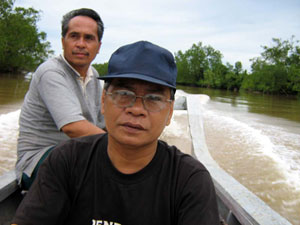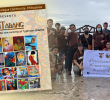Several companies managed to encroach into their area in the past years but the people organized a number of blockades and some of the companies have left, says Mujah.
On the third day of the gawai, men from the longhouse came knocking at his door. They just learned that the government has already leased out the land in their backyard to the Mega Hati Sendran Berhad company, which is supposed to turn it into an palm-oil plantation.
The area in question is part of the 800,000 hectares of land that is supposed to belong to their kampung under Native Customary Land Rights. SADIA uncovered the whole deal from the Land Survey Division and is going to contest it in Court.

High Tide. Nicholas “Mujah” Ason and his brother have to wait for high tide to travel upriver by boat, the fastest way to reach their riverside kampung (village) of Ensika. Mujah, who is named after a legendary Iban warrior, is leading the legal battle against the incursion to their ancestral land. (davaotoday.com photo by Germelina A. Lacorte)
With these existing disputes about land, Mujah says he considers the economic survival of his people more relevant than the concern for culture and religion. �If your land is protected, you will feel secure enough to practice your beliefs. Your whole existence, your belief systems are all in that land,� he says.
�I�m thinking only in the economic sense,� says Mujah. �The old beliefs have been closely tied to the land, to subsistence farming, which could not sustain us anymore,� he says. �Somehow, the Ibans have to adapt to change in order to keep up.”
�If you look into the map, the native land of Sarawak, there is no more native land left. Everything has been given to companies who now own or lease the land,� says Mujah. �The old system makes them vulnerable, their rights and their culture easily manipulated.�
Right now, he says, most of the young generation has been leaving the kampung to study elsewhere and then spending the rest of their lives working in cities and factories.
(As Malaysia gears toward the industrialized economy, government has been persuading the tribe to adapt to changes, which include abandoning the old ways of life, which traps them to the traditional relationships with the land.) When the roads will already reach our kampung, you can�t expect us to take the boats anymore, says William Eddie Gaong, Mujah�s uncle.)
Throughout Malaysia, there have been several court decisions that recognize indigenous peoples rights to their traditional land. Among these celebrated cases was the case of Iban Nor anak Nyawai against the Borneo Pulp and Paper Company in 2002, where the Court ruled that the Ibans in Bintulu have rights over their customary lands, including the forests. Although the case dragged on for at least five years in Court, it has inspired defenders of native customary land rights like Mujah to file more cases in Court over the various contested territories in Sarawak.
As Malaysia seeks to industrialize, a number of development projects have been set up in different parts of Sarawak, displacing indigenous tribes from their lands. Among these projects were the Batang-ai hydropower project set up in Bintulu area in 1985, which displaced thousands of people, and the controversial Bakun Dam, which was originally proposed to flood an area the size of Singapore, displacing over 10,000 people. The environment group Borneo Resources Institute (BRIMAS) and Rengah-Sarawak (Rengah is the Penan word for news) also reported numerous development projects that have been displacing indigenous tribes in different parts of Sarawak.
Indigenous Peoples









